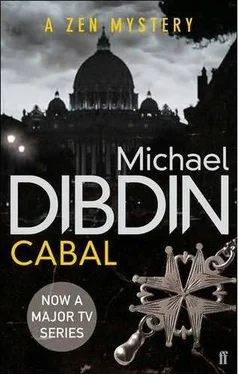Michael Dibdin - Cabal
Здесь есть возможность читать онлайн «Michael Dibdin - Cabal» весь текст электронной книги совершенно бесплатно (целиком полную версию без сокращений). В некоторых случаях можно слушать аудио, скачать через торрент в формате fb2 и присутствует краткое содержание. Жанр: Полицейский детектив, на английском языке. Описание произведения, (предисловие) а так же отзывы посетителей доступны на портале библиотеки ЛибКат.
- Название:Cabal
- Автор:
- Жанр:
- Год:неизвестен
- ISBN:нет данных
- Рейтинг книги:5 / 5. Голосов: 1
-
Избранное:Добавить в избранное
- Отзывы:
-
Ваша оценка:
- 100
- 1
- 2
- 3
- 4
- 5
Cabal: краткое содержание, описание и аннотация
Предлагаем к чтению аннотацию, описание, краткое содержание или предисловие (зависит от того, что написал сам автор книги «Cabal»). Если вы не нашли необходимую информацию о книге — напишите в комментариях, мы постараемся отыскать её.
Cabal — читать онлайн бесплатно полную книгу (весь текст) целиком
Ниже представлен текст книги, разбитый по страницам. Система сохранения места последней прочитанной страницы, позволяет с удобством читать онлайн бесплатно книгу «Cabal», без необходимости каждый раз заново искать на чём Вы остановились. Поставьте закладку, и сможете в любой момент перейти на страницу, на которой закончили чтение.
Интервал:
Закладка:
‘On the train up here this morning,’ he continued, ‘I was approached by the same man. He asked why I was travelling to Milan. I said I had an appointment with one of his colleagues at the Procura. He must have realized then that the game was up, I suppose. He went off towards the toilets, fused the lights and threw himself out.’
The woman looked steadily at Zen.
‘Describe him.’
‘Burly, muscular. Big moon face, slightly dished. Strong nasal accent, from the Bergamo area, I should say. Smoked panatellas.’
Antonia Simonelli selected a photograph from the file lying open on the desk and passed it to Zen. A paper sticker at the bottom read ZEPPEGNO, MARCO. Zen suppressed a gasp of surprise. There had been so many fakes and hoaxes in the case so far — including the fifty million lire, which had turned out to consist of a thin layer of real notes covering bundles of blank paper — that he had assumed that the names which appeared in the transcript were also pseudonyms. But perhaps Ruspanti had deliberately raised the stakes by mentioning the real name of one of the men he was threatening on a phone he knew to be tapped, making it clear that he was ready to start playing dirty. That would certainly explain why the individual concerned had been desperate to suppress the transcript by any means, including the murder of Giovanni Grimaldi.
Zen handed the photograph back.
‘You know about him, then?’
Antonia Simonelli nodded.
‘I know all about him!’
‘Including whether he is — was — a member of the Order of Malta?’
She looked at him with surprise.
‘What’s that got to do with it?’
Zen said nothing. After a moment, the magistrate tapped the keyboard of the laptop computer.
‘Since 1975,’ she said.
‘It wasn’t an aspect of his activities that concerned you?’
She gave a frown of what looked like genuine puzzlement.
‘Only in that it was perfectly typical of him. Joining the Order is something that businessmen like Zeppegno like to do at a certain point. It provides social cachet and range of useful contacts, and demonstrates that your heart is in the right place and your bank account healthy. But I repeat, why do you ask?’
Zen shrugged.
‘He was wearing the badge, on the train. I asked him if he was a member, and he said he was. I just wondered if that was a lie too, like everything else he had told me.’
Antonia Simonelli wagged her finger at him.
‘On the contrary, dottore! Apart from the little matter of his identity, everything he told you was true.’
A smile unexpectedly appeared on the woman’s face, softening her features and providing a brief glimpse of the private person.
‘Antonio Simonelli, indeed!’ she exclaimed. ‘You have to hand it to the old bastard. What a nerve! Supposing we had been in touch before, and you were aware of my gender?’
‘He checked that by suggesting that we had. It was only when I said I didn’t know him — you — that he asked to meet me.’
She sighed.
‘So he’s dead?’
‘Well, the identification still has to be confirmed, of course, but…’
‘Who’s handling the case?’
‘Bologna. That took another half hour to work out. He jumped out right on the border between Tuscany and Emilia-Romagna. In the end we had to get a length of rope and measure the distance from the body to the nearest kilometre marker.’
‘And there’s no doubt that it was suicide?’
Zen looked away. This was the question he had been asking himself ever since the torch beams picked out the corpse sprawled by the trackside. The circumstances had conspired to prevent anything but the most cursory investigation at the scene. Short of closing the Apennine tunnel, and thus paralysing rail travel throughout Italy, the corpse could not be left in situ while the Carabinieri in Bologna dispatched their scene-of-crime experts. Fortunately there happened to be a doctor travelling on the train who was able to pronounce the victim dead. Zen then carried out a nominal inspection before authorizing the removal of the body. By the time the train reached Bologna, no one had the slightest interest in questioning that they were dealing with a case of suicide. The only remaining mystery was the victim’s identity, since there were no papers or documents on the body.
Zen shook his head.
‘The only person who was anywhere near him when he fell from the train was a woman who had gone to the toilet, and she wouldn’t have had the strength. Anyway, she was a German tourist with no connection with the dead man. No, he must have done it himself. There’s simply no other possibility.’
Antonia Simonelli got up from her desk.
‘I’m sure you’re right, dottore,’ she said. ‘It’s just that I’d come to know Zeppegno quite well, and if you’d asked me, I’d have said that he just wasn’t someone who would ever commit suicide. He thought too highly of himself for that.’
She waved at the file, the photographs, the computer.
‘For the past five years I have been painstakingly assembling a case against a cartel of Milanese businessmen. Zeppegno was typical. His family were provincial bourgeois with aspirations. His father ran an electrical business in a town near Bergamo. By a combination of graft and hard work, Marco gradually built up a chain of household appliance suppliers in small towns across Lombardy. As an individual unit, each of his outlets was modest enough, but taken together they represented a profitable slice of the market.
‘Like other entrepreneurs, Zeppegno hated paying taxes and wanted to be able to invest his money freely. The answer was to cream off a percentage of his pre-tax profits and invest them abroad. The problem was how to do it. Big businesses have their own ways around the currency control laws, of course. You order a consignment of raw material from a foreign supplier who is prepared to play along. This is duly invoiced and paid for, but the goods in question are never shipped, and the money ends up in the off-shore bank account of your choice. There’s an element of risk involved, but in a big outfit with a complex structure and a high volume of foreign trade the danger is minimal. The bogus orders can be hidden amongst a mass of legitimate transactions, and if all else fails i finanzieri have on occasion been known to look the other way.’
Zen acknowledged the gibe with a blink. The venality of the Finance Ministry’s enforcement officials was legendary.
‘The turnover of a company like Zeppegno’s was far too small to conceal that sort of scam successfully. Which is where the late Ludovico Ruspanti came in. It didn’t hurt that he was an aristocrat, of course. Self-made provincials like Zeppegno tend to retain the prejudices of their class. A title like “Prince” not only helped convince them that their money was safe in Ruspanti’s hands, but reassured them that what they were doing was nothing much to be ashamed of, since a man like him was involved. The procedure itself couldn’t have been simpler or more convenient. You simply wrote Ruspanti a cheque for whatever amount you wished to dispose of. If you preferred, of course, you could hand it over in cash. He deposited the money in his account at the Vatican bank, and it was then transferred — less his fee — to your foreign bank account.
‘The fascinating thing about this arrangement is that while the ensemble constitutes a flagrant breach of the law, each of the individual operations is in itself perfectly legal. There is no law against one Italian citizen donating a large sum of money to another. If the recipient happens to be one of the privileged few who enjoy the right to an account at the Institute for the Works of Religion, it is perfectly in order for him to deposit the money there. And since that institution is extraterritorial, what subsequently happens to the money is of no concern to the Italian authorities.’
Читать дальшеИнтервал:
Закладка:
Похожие книги на «Cabal»
Представляем Вашему вниманию похожие книги на «Cabal» списком для выбора. Мы отобрали схожую по названию и смыслу литературу в надежде предоставить читателям больше вариантов отыскать новые, интересные, ещё непрочитанные произведения.
Обсуждение, отзывы о книге «Cabal» и просто собственные мнения читателей. Оставьте ваши комментарии, напишите, что Вы думаете о произведении, его смысле или главных героях. Укажите что конкретно понравилось, а что нет, и почему Вы так считаете.












